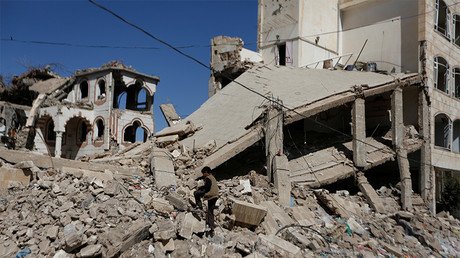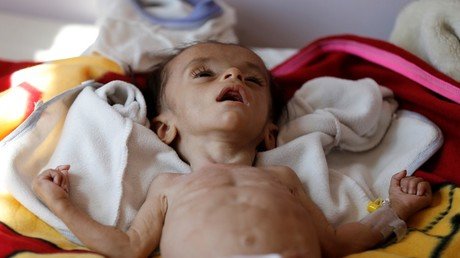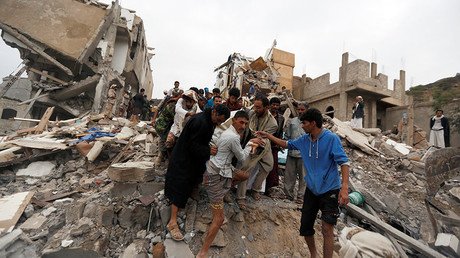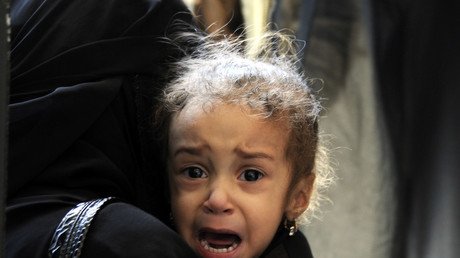How bad does Yemen need to get before Britain stops selling weapons to Saudi? (VIDEO)

It’s been 50 years since the British Empire left its foothold in Aden. Given the half-hearted attempts of Her Majesty’s Government to end the horrors in Yemen today, you’d be forgiven for thinking they shared no history at all.
In the closing months of 1967, Yemeni rebels concluded their campaign to oust the British presence, ending almost 130 years of colonial domination. Colonel Brian Lees, former defense attaché to Saudi Arabia, served during the British withdrawal.
“It was all very clumsily arranged. And I think it was not our finest hour from our relations with the Arab world,” said Lees.
“I think it’s probably one of the biggest mistakes we made in that period in our relations with the world, the decision by [then-Prime Minister Harold] Wilson to withdraw from the Middle East. We abandoned them, in fact. That is what it boiled down to.”
Fast forward half a century, and Britain has abandoned the Yemenis yet again. A Saudi-led coalition, using weapons, logistics and training supplied by the West, has launched a ferocious air war to restore the authority of President Hadi.
The civil war in Yemen escalated in March 2015 when Iranian-backed Houthi rebels seized the capital, Sanaa. The war, which has blighted the region with famine and cholera, has killed 10,000 civilians and injured 40,000 more, according to the UN.
Britain’s re-conquest of Yemen is not a practical solution, nor one anybody would seriously consider. But surely Britain, with its special relationship with Riyadh, could be doing far more to end the slaughter?
“We don’t have the diplomatic clout to do it anymore, I’m afraid,” said Lees. “Probably because everyone is so concerned with Brexit that the rest of the world can go hang, as far as the Foreign Office is concerned.”
“We haven’t played our hand at all well in the Middle East, I’m afraid.”
Should Britain stop arming Saudi?
Critics of the Saudi-led war say Britain has a moral and historical obligation to stop selling weapons to the Gulf kingdom and to pressure Riyadh diplomatically. Andrew Smith, spokesman for Campaign Against Arms Trade, thinks Britain has failed to take the initiative – frankly, because it shares the blame.
“With the atrocities that are being committed in Yemen every day, if the UK government hasn’t had any interest in flagging them up it’s because it has been so utterly complicit in the destruction which is taking place,” said Smith.
“I expect Theresa May and her colleagues are deeply ashamed of what’s happening. One of the worst humanitarian crises in the world has been inflicted on one of the poorest countries in the world. And UK arms have been central to that.”
Colonel Lees is not convinced. “I don’t think we have anything to be ashamed of,” he said.
“If the Saudis want to use the arms for instance in Yemen, provided they’re using it sensibly, then there’s no reason why they shouldn’t use it. Any arms you sell will be used like that. But our restrictions on selling arms are very strict, much stricter than almost any other country as far as I remember, as far as I know, much stricter than the French or even the Americans.”
“I have no qualms about what we have sold to the Saudis. I have doubts as to whether the weapons have been used sensibly. But that’s a personal, military criticism, nothing to do with whether or not it’s legal or moral. It’s wrong to take a moral judgement on these things.”
So, what exactly has Britain been selling to the Saudis? The really expensive items are fighter jets – Tornados and Typhoon Eurofighters. The UK has also supplied helicopters, drones, and armored vehicles.
Missiles, including Stormshadows and Brimstones, are another big seller. Aircraft components and sniper rifles are among the more recent deliveries, topped off with a selection of anti-riot gear, spy kit and security software.
Like it or not, the war in Yemen has made a lot of money and sustains thousands of high tech manufacturing jobs in the UK.
“This has been a huge money-making success for BAE Systems, Raytheon and MBDA,” Smith said. “They’ve all been rolling in the money from the conflict, because if there’s one industry which is dependent on war and conflict to survive, it’s obviously the arms trade. You’re talking about an industry where the people who are making money from it are so detached from the outcomes of it.
“The people who are cashing in on the destruction of Yemen aren’t people who are ever going to experience being in a village which is being bombed by Saudi forces, they’re never going to see the devastating consequences of the brutal weapons which they sell,” Smith added.
What do Yemenis think?
British Yemenis make up one of Britain’s oldest Muslim communities. Underscoring the wealth of empire, many came to work in shipping and heavy industries. In Sheffield, they worked in steel.
Dr Abdul Galil Shaif Alshaibi, a leading figure in that city’s Yemeni community, thinks the issue goes far deeper than the rights and wrongs of selling weapons. He says it’s a bigger story of corruption, stagnation, and of years of neglect.
“Selling arms is an issue to do with jobs now, it’s an issue to do with economic prosperity in this country. And you’re absolutely right – if we didn’t sell arms to Saudi Arabia, I’m sure somebody else will. And the arms that come Russia or from China are no less dangerous than the ones that you sell from Britain,” he said.
“At the moment we have 5,000 people a day suffering from cholera – that’s enormous. We have 60 percent unemployment among young people. What are they doing for 24 hours? Sixty percent? That’s almost 12 million people … Can you imagine what a field day that would be for somebody who’s heading al Qaeda and Daesh [Islamic State, formerly ISIS] to actually go and connect with these young people that are doing nothing for 24 hours a day – or their lives? There’s a generation that’s been lost, that basically has no job, no opportunity.”
“Britain should be using that diplomatic power to make peace in Yemen, to bring stability, because the very things that the British public are complaining about, which is terrorism, only come because Yemen is weak, Yemen is poor, Yemen doesn’t have a government with the right governance, the people in charge in Yemen are corrupt, the state doesn’t have sway all over Yemen, from Hadhramaut to Sa’dah, there are pockets that are left without real governance. And I think these are the very things that hit us back.”
Perhaps the solution is investment and development, which would allow Yemenis to finally profit from their excellent strategic location, long-recognized by successive empires.
As for British weapons, scrapping arms sales to Saudi Arabia would certainly send an important message. But would it end Yemen’s suffering, or merely change the brand of weapons killing them?
Whatever action it eventually takes, the British government is slowly realizing that allowing the world’s worst humanitarian crisis to continue is too great a price to pay to keep its Saudi customers happy.
















